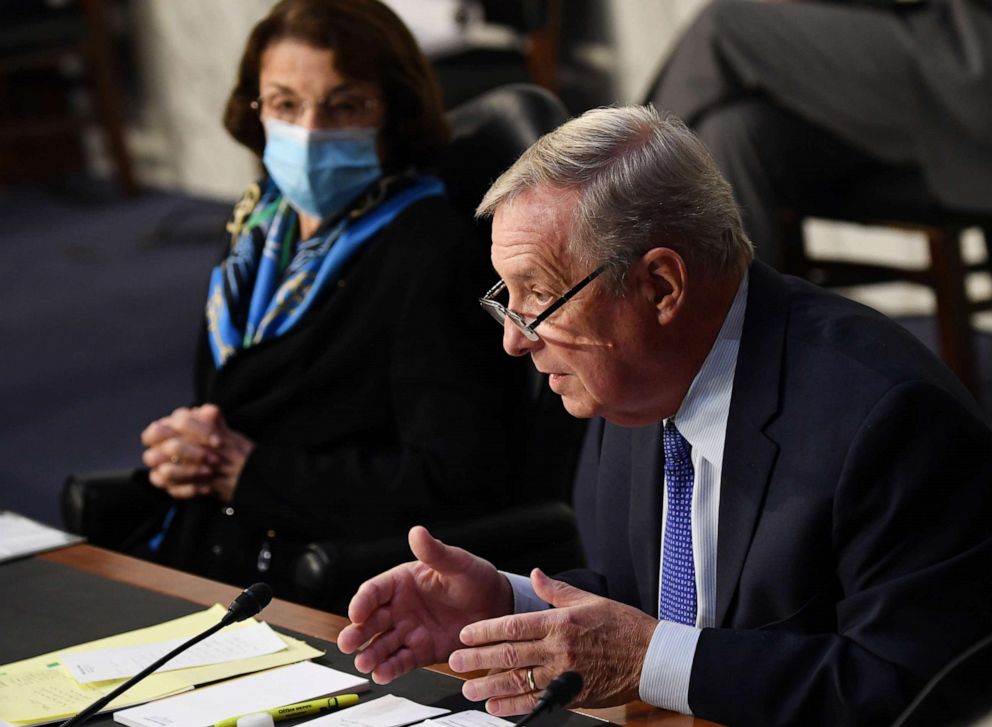Committee breaks for lunch
Graham announced the Senate Judiciary Committee is in recess until 12:30 p.m.
Sen. Amy Klobuchar, D-Minn., is up next to question Barrett.
The Supreme Court nominee finished 19 hours facing questions.
The confirmation hearings for Judge Amy Coney Barrett, President Donald Trump’s Supreme Court nominee, continued Wednesday with seven more hours of questioning.
Senate Republicans are keeping up their push for a final vote before Election Day despite Democratic calls to let voters decide who should pick a new justice.
Trump nominated Barrett to fill the seat left open by the late Justice Ruth Bader Ginsburg.
The four days of Senate Judiciary Committee hearings, overseen by Chairman Lindsey Graham, are unprecedented, with some members participating virtually and in-person. Barrett has appeared at the witness table to face questions for 19 hours total over two days.
Hearings begin at 9 a.m. each day and will be live streamed on ABC News Live.
The question and answer portion began Tuesday with Democrats arguing protections from landmark cases on health care and same-sex marriage are at risk with Barrett's nomination, while Republicans afforded her opportunities to defend her impartiality as a judge.
Barrett, 48, was a law clerk to conservative Justice Antonin Scalia and follows his originalist interpretation of the Constitution. She practiced law at a Washington firm for two years before returning to her alma mater, Notre Dame Law School, to teach. She was nominated by Trump in 2017 to the Seventh U.S. Circuit Court of Appeals and confirmed by the Senate in a 55-43 vote.
Graham announced the Senate Judiciary Committee is in recess until 12:30 p.m.
Sen. Amy Klobuchar, D-Minn., is up next to question Barrett.
Sen. Ted Cruz, R-Texas, slammed Democrats at the top of his questioning for their lack of physical presence in the room and said it signals they have no “substantive criticisms” against the “respected scholar.”
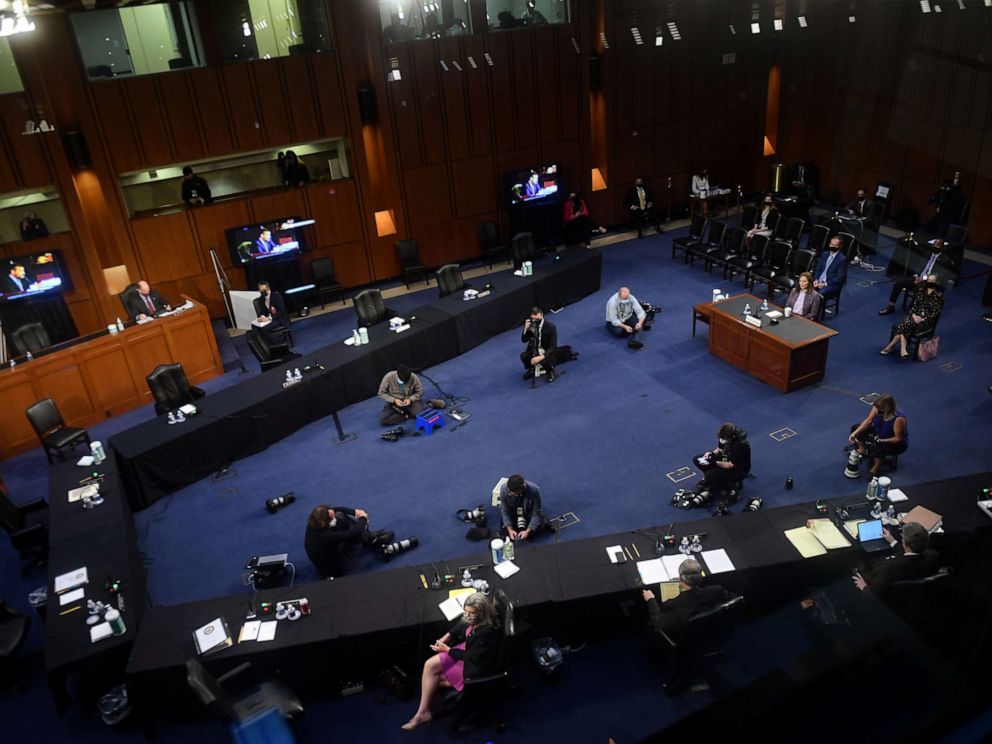
“First of all, the last three days of hearings have revealed good news. They have revealed the news that Judge Barrett is going to be confirmed by this committee, by the full Senate,” Cruz said. “Two full days of questions, we have seen that our Democratic colleagues have very few questions actually to raise about Judge Barrett's qualifications, very little of the time we have spent in here has concerned her record.”
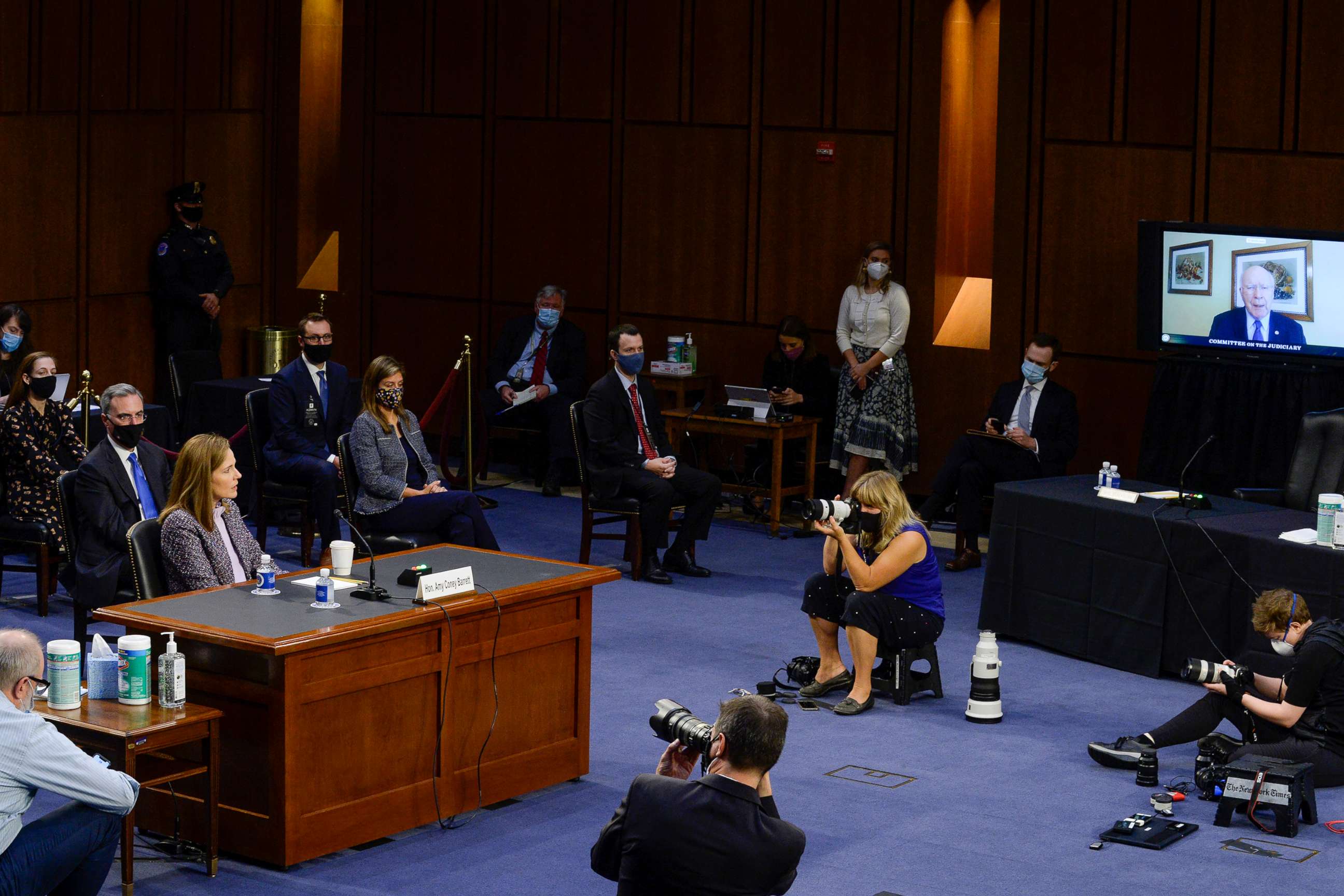
Instead, he said, Democrats have made the hearing a political attack against the president and “largely abandoned” making any case against Barrett.
“It is striking, as we sit here right now in this committee room, there are only two Democratic senators in the room. If you look at the dias, there’s chair after chair after chair that is empty. Democratic senators are no longer even attending. I assume they will show up for their time. But it is indicative of what they are tacitly admitting, that they don’t have substantive criticisms,” Cruz said.
Sen. Dick Durbin, D-Ill., then interrupted.
"Mr. Chairman, may I make a point of personal privilege?” Durbin asked Graham.
“Of course,” Cruz said with a smile. “Of course, as you may”
“We are in the midst of a COVID-19 crisis, a pandemic. And some members are in their offices following this on television and to suggest their absence here means they are not following or participating is incorrect,” Durbin said.
Sen. Kamala Harris, D-Calif., and Sen. Patrick Leahy, D-Vt., are the two committee members of 22 who opted to particate virtually.
A key goal of Republican questioning is establishing that Barrett is able to separate her personal beliefs from her judicial rulings.
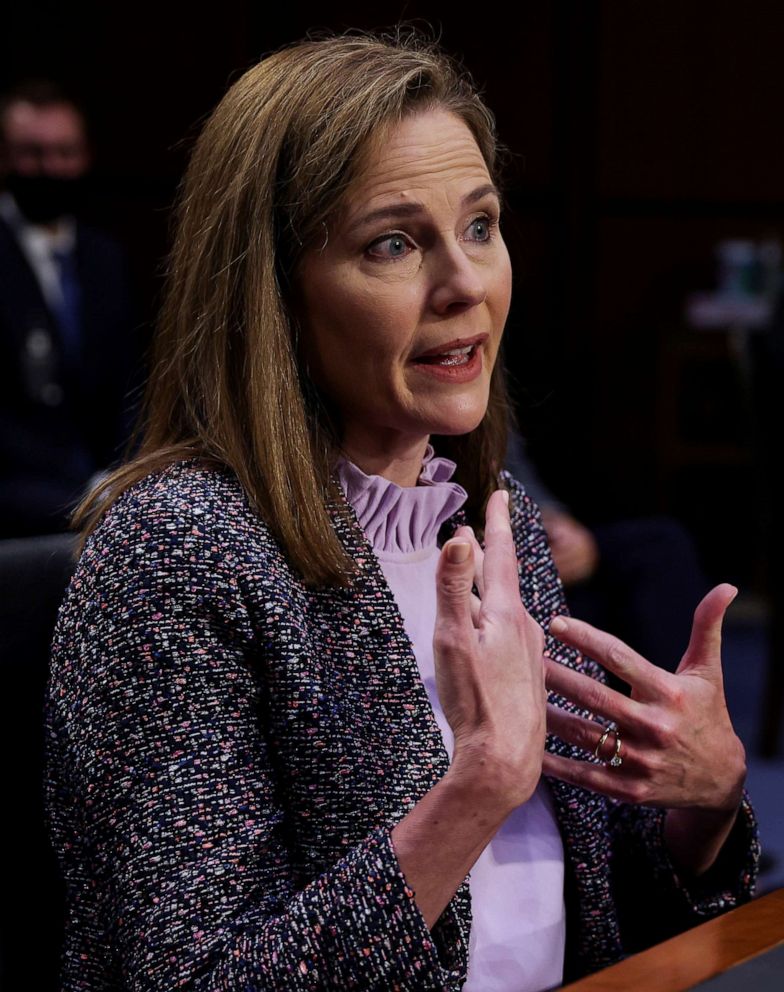
Sen. Mike Lee, R-Utah, used his time to focus on religious freedoms, saying Democrats have highlighted on what Barrett has said about her personal beliefs on abortion because they don't want to focus on cases in which Barrett has voted in favor of abortion rights groups. He named one case that restricted protester access to abortion clinics.
"I have colleagues on the other side of the aisle who want to focus on statements made in your personal capacity, in your capacity as a private citizen and a member of your faith as opposed to addressing cases dealing with abortion. This is because your record on the Seventh Circuit shows you are able to set aside your personal convictions," Lee said.
Lee said Barrett made her decision "as a jurist, rather than following anything that guided you."
-ABC News’ Allie Pecorin
Sen. Dick Durbin, D-Ill., raised Barrett's dissent in a case she dealt with on the Seventh Circuit Court of Appeals, Kanter v. Barr, in which she suggested the Constitution protects the right of non-violent felons to own guns but does not protect their right to vote -- a right she wrote belongs "only to virtuous citizens."
"Here is what it boils down to," Durbin said, laying out his case. "After Heller, after the decision, after Scalia's statement, you concluded that any felony can take away your right to vote, but only a violent felony can take away your right to purchase an AK-47."

"Senator, with respect, that is distorting my position," Barrett interrupted. "What I said in the case, which is what Heller said and which is conventional in all discussions of this, to my knowledge, is that the right to vote is fundamental. However, it is an individual, fundamental right we possess, but we possess it as part of our civic responsibility for the common good."
"It is a distortion of the case that I ever said that voting is a second-class right," she added.
Durbin pressed forward, hoping to get a new answer from Barrett, but she held her ground.
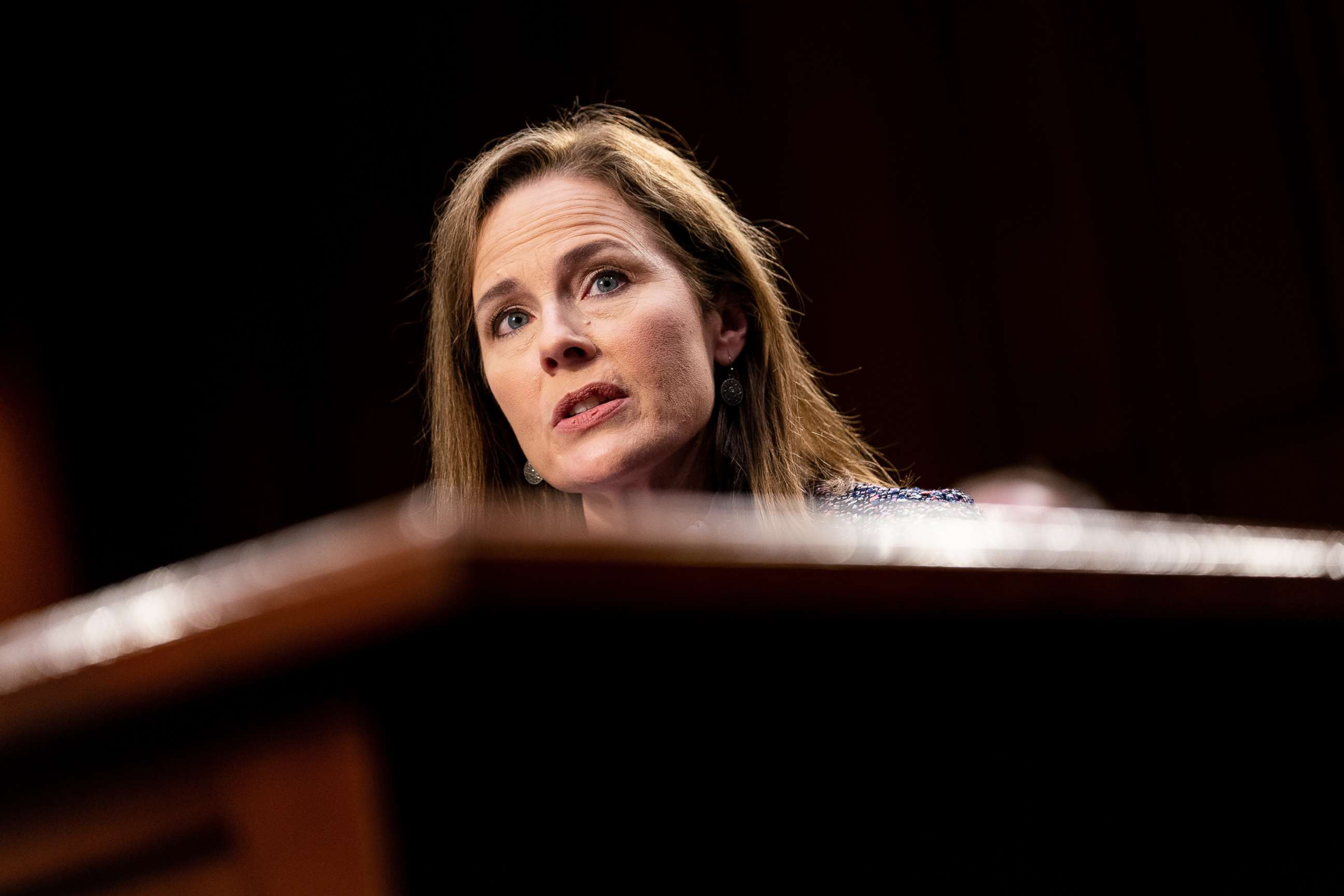
"When you finished with your dissent here’s what it came down to say, if you are guilty of a felony that is not violent, you can lose your right to vote. You can't lose your right to buy a gun. Am I wrong?"
"Senator, Kantor had nothing to do with the right to vote. The point I was making in that passage, the 14th Amendment actually expressly allows for states to deprive felons the right to vote. And my point was there is no similar language in the Second Amendment," she began.
"I don't have an opinion and have never expressed one about the scope of a legislature’s authority to take away felon voting rights. What I said is there is a history of provisions and state constitutions and the federal Constitution, but I did not intend and if my words communicated that, this is a miscommunication. I never denigrated the right to vote," she said.
To which Durbin replied, "It was, at best, a serious miscommunication."
In another line of questioning, Durbin pressed Barrett on why she won’t say whether a president can unilaterally delay an election and she reiterated that she won’t discuss “legal hypotheticals” whether they are "easy or hard" questions.
